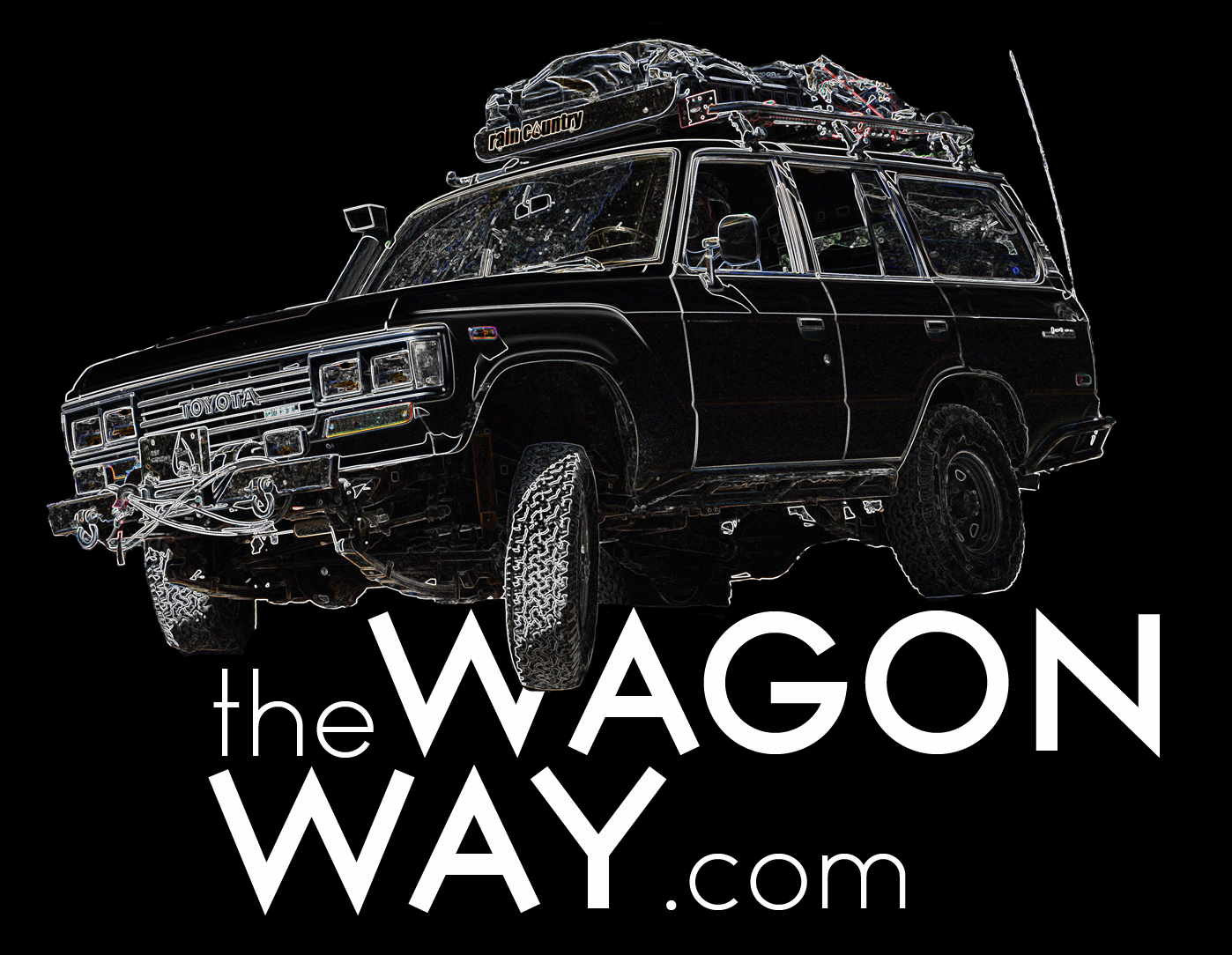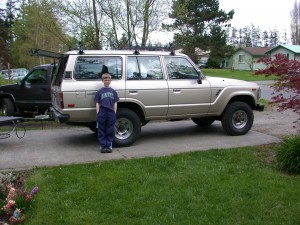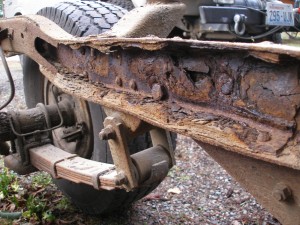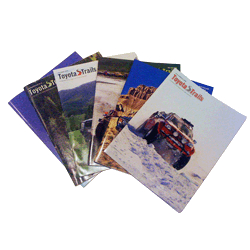This all came about from a conversation with my son, Benjamin who happens to be about 3500 miles away right now. He wanted to know just what to look for in a used 60 (glad to see he is coming to his senses). Figured this would be much easier if I wrote it down and hopefully this will keep me from forgeting anything. Realistically it’s not all that different from buying any other used car but we can point out some areas to check.
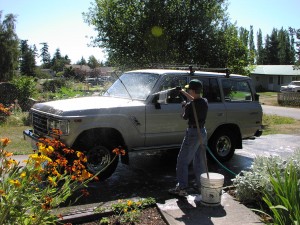 First of all these rigs are not getting any younger, the first ones are over 30 years old and even the newest one is at least 21 years old. There are going to be leaks and minor rust and hopefully neither will be all that bad. Neglected rigs can be in pretty good shape but even better is if the previous owner(s) have taken care of the rig. Frequently a quick glance will tell you how well the owner took care of it, used and cared for just feels and looks different than a car that has just been cleaned up or detailed.
First of all these rigs are not getting any younger, the first ones are over 30 years old and even the newest one is at least 21 years old. There are going to be leaks and minor rust and hopefully neither will be all that bad. Neglected rigs can be in pretty good shape but even better is if the previous owner(s) have taken care of the rig. Frequently a quick glance will tell you how well the owner took care of it, used and cared for just feels and looks different than a car that has just been cleaned up or detailed.
The best wagon to buy is one you know the history of. I got my 62 this way. My sister bought it new and had it for ten years before I ended up with it. I knew how it was maintained and that it had never been off road. Erics 62 had a similar fate as he got his from his Uncle. Family is a great source for a wagon if there is one available.
First impressions are just that. Overall what does the rig feel like? Is the paint in good shape? What are the tires like? Does it even run? Price sets how picky you should be. The higher the price the pickier you should be and with a lower price you can overlook things
Mileage hi or low? Toyota was nice enough to run 6 digit odometers so no need to worry about the speedo turning over for the third time. Then again they could have swapped the dash. Does everything on the dash work, heater lights, ac, accessories, blinkers wipers etc Is the dash cover cracked? How is the upholstery, trim, headliner. Any windshield cracks?
You only get what you pay for if you know what to look for. What exactly are you looking at and what does it mean? If some of this terminology doesn’t make sense it might be a good idea to take someone with you who does know wagons at least until you have looked at a few and have a better idea of what you are looking at.
Mechanicals
Hows the rig run, does it start easy. Ask the owner not to run the rig before you get there. How’s it shift, any grinding between shifts. Grinding while shifting with a warm tranny could mean the synchro’s are shot. I am fighting this one right now in my diesel (I have the parts, just waiting for a good time with better weather). 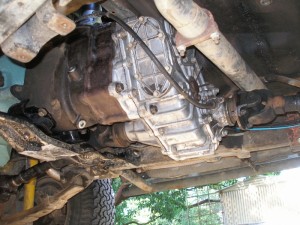 Tranny will shift differently depending on whether it is cold or hot. How’s the t-case shift? Does it go through the pattern OK. Do the hubs function OK, not too stiff or too loose, grab the front driveshaft to ensure the t-case is engaging.
Tranny will shift differently depending on whether it is cold or hot. How’s the t-case shift? Does it go through the pattern OK. Do the hubs function OK, not too stiff or too loose, grab the front driveshaft to ensure the t-case is engaging.
While the hood is up take a good look at the belts and hoses. What shape are the vacuum lines and wiring in. Does everything appear to be connected. Like I said there will be leaks but what ones are hard to fix and what ones are not as critical.
Leaky knuckles are not that big of a deal, often overlooked by non wheelers and the rig probably needs a brake job anyway. And since you have to pull the hub to do a brake job you are already half way to a knuckle seal replacement. Power steering box covered in fluid and dirt needs a closer look. Leaky t-case seals are not uncommon but look for that caked up blend of dirt and oil to see if it has been a long term thing, A greasy transmission may be a simple as the boot around the shift lever letting oil get by. I even bought a 5 speed that was missing a plug in the top cover that let 90 wt out the back all over the t-case.
Check the fluid levels in the gear boxes if possible. Pinion seals leaking isn’t good but is not insurmountable either. Make sure to grab the pinion flange and check for movement. Looseness could be a sign of a worn out pinion bearing or a loose pinion nut. Rear engine main seal leaks are not that uncommon either. Don’t be surprised by the oil and grease that is thrown off the u-joints and plastered on the bottom of the rig, they all seem to have this grime. Are the u-joints in good shape, any slop in the slip joint of the yoke.
A caked on mixed of dirt and fluid generally indicates the leak has been there awhile. And unless there is a puddle under the rig everyday the leak probably isn’t all that bad.
The biggest threat to older 60’s is the elements. You need to take a careful and thorough look for rust. And there are some common trouble spots on these wagons. So be sure to wear grubby clothes or bring coveralls on the day you look at a rig, you need to crawl around on the ground.
Rocker panels are a good place to start. The floors have a few trouble spots, along the door sills, the bottom corner by your feet, around the rear wheel wells, Other places to look include inside the tailgate, inside of the rear frame channel, rear quarter panels, leading edge of the doors near the hinges (not the outside edge) The oil pan! Just check my oil pan build article for why. Corroded inner fenders at the front and rear, Radiator support next to body mount and attachement of inner fenders. Holes under battery, rotten battery tray. Dont forgot to look at the exhaust while you are on the ground, what shape is the exhaust in. Any holes? Muffler shot?
Accessories
Some add ons will add value and others just don’t mean a lot. And don’t take someones word that such and such a part was installed unless you can verify it, and I wouldn’t take a receipt as proof it was installed. Unless of course it’s the install receipt from a reputable shop that includes the license/vin number of the rig you are looking at.
Big tires don’t add value unless they are the tires you want to end up with. Lift kits can be a good thing especially a name brand product as they can cost a fair chunk of money to add later. A fancy stereo has never done much for me. A bunch of lights are just that and no more.
Pulling the Trigger
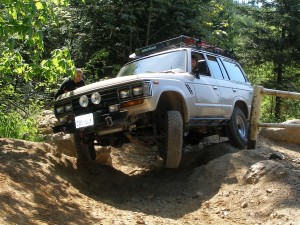 Absolutely everything mentioned here on a 60 can be fixed, repaired or even replaced. And you are not likely to find all of this on the same rig. And if you do that rig is terminal and not worth saving. Might be worth some parts but no more.
Absolutely everything mentioned here on a 60 can be fixed, repaired or even replaced. And you are not likely to find all of this on the same rig. And if you do that rig is terminal and not worth saving. Might be worth some parts but no more.
You need to decide just how much rebuilding/repair you want to do. Project rigs are great if that is what you are looking for. Do take into account your own mechanical skill level and the availability of help when you need it. If you want a ready to go daily driver they are available. Even hard core wheelers are out there.
But my preference is to get a wagon that hasn’t been abused and chopped up. I want to do that myself!
So if you are on the other side of the coin and have a rust free, low mileage, never been wheeled wagon gathering dust make sure to call me. I want it.
